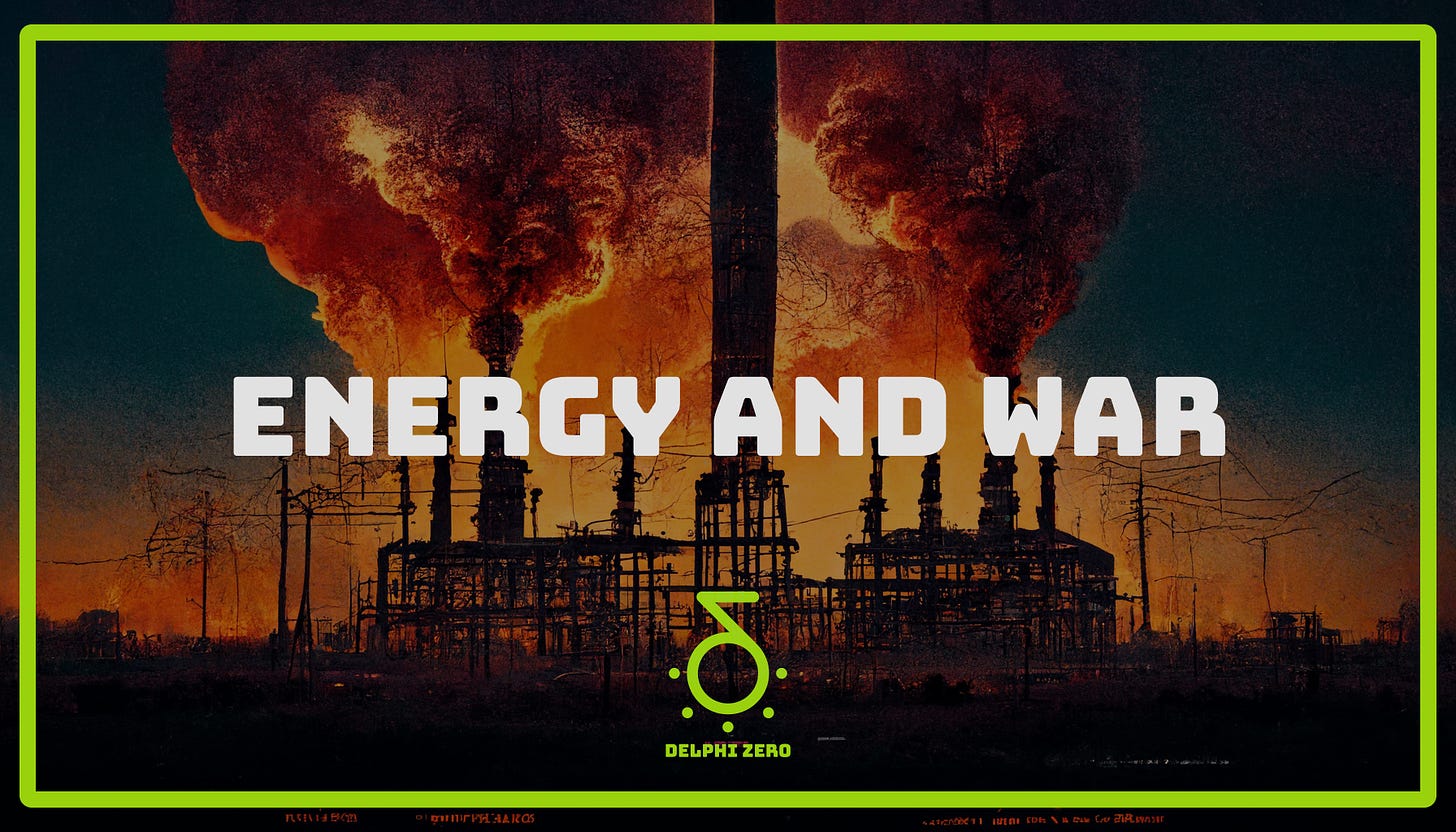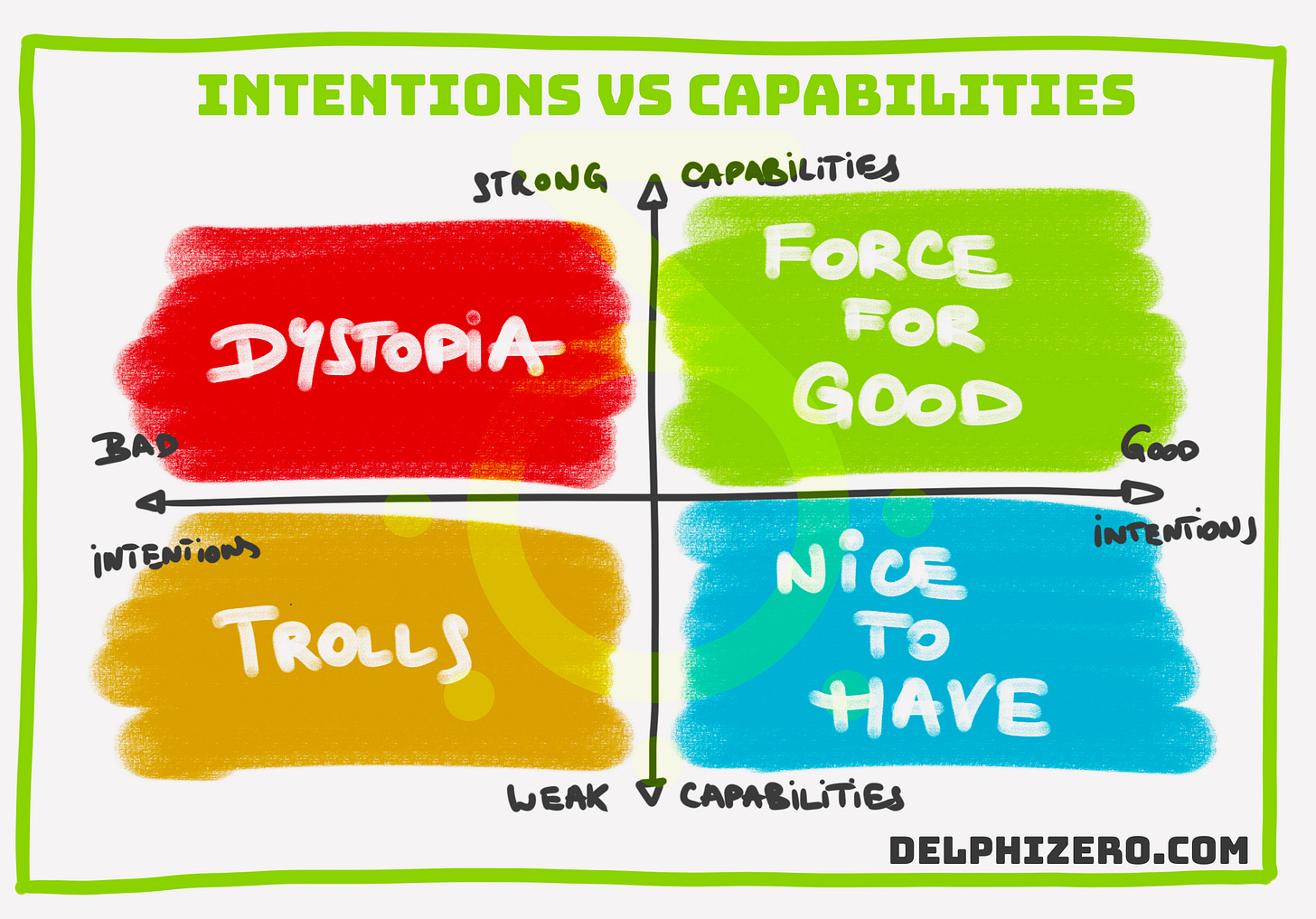Energy and War
Strong capabilities and bad intentions are a dangerous mix.
👋 Hello to 52 new readers who joined! We are 422 climate buddies now 🌳
In the last essay, we took a fictional trip into the past 🚕 This week’s essay is a hard look at reality.
Before we get into the essay, I’d like to address 3 points:
What’s up with the Wharton/UPenn, MIT, and UWaterloo students joining this newsletter? If one of you is reading this, please let me know how you found Delphi Zero 🤷♂️ I’m truly curious how you got here.
Last week, I started my Energy Law degree at TU Berlin. Fascinating stuff and truly amazing instructors. For example, one of our teachers wrote the “Fit for 55” package of the European Green Deal 🤯 … I’m definitely going to share my front-line insight into EU energy law + policy with you. Pinky promise 🤙
If you have any particular questions about (a) energy law, (b) energy policy, (c) energy security, or anything else really, please ask me via email or Twitter. I promise to respond directly or via an essay.
Enough housekeeping, let’s dive into Energy’s dark capabilities ⚡️
Energy and War
By Art Lapinsch
War is something that my family experienced firsthand.
My parents had the courage to emigrate from the Soviet Union back in 1989. Little did they know that our new home would become the battleground of the Yugoslavian Civil War. In 1992 we became refugees.
I concluded my essay with the following words: I might not remember, but I will never forget. War does something to people.
As a result, the major events in 2022 pushed me down the energy and climate rabbit hole 🕳🐇
In February, I became obsessed with security policy. This led me straight to energy policy and European failures of the past decades. And eventually, I ended up at the intersection of Energy x Climate x Security 🔋 x 🌳 x 🛡
Today, I’ll discuss two insights that shaped my thinking in the past months:
The Fundamentals of the Energy Trilemma
The Dangerous Capabilities of Energy
Additionally, I have an interesting question for you: How much drinking water do you have at home right now?
Think about it for a second and remember the amount. We’ll get back to this question in a bit.
The Energy Trilemma
Our world is divided into win-win and win-lose games.
Win-win: Positive-sum games are where both of us emerge as winners.
Win-lose: Zero-sum games are situations where my advantage is your loss.
In the world of big energy decisions, there’s an important win-lose-lose game: The Energy Trilemma
Decision makers have to strike a balance between three main targets:
Finance: How can we get the most affordable energy?
Politics: How can we get the most secure supply of energy?
Environment: How can we get the cleanest and most equitable energy?
Unfortunately, these three goals are currently at odds with each other. One wins, and the others lose.

Let’s discuss the Energy Trilemma with a current example 🇩🇪
Germany’s Rodeo with the Energy Trilemma 🤔
If policymaking were easy, you or I would be sitting in government. Because it isn’t, we are facing the current European energy supply shortage.
Let’s look at the trade-offs in energy policy:
Politics: When it comes to world peace, Germany’s instrument of choice was trade. Governments followed the idea of “Wandel durch Handel” - the basic idea that economic integration would reduce the risk of armed conflict. What worked in the European Union would certainly work with Russia too, right? Hindsight 20/20 it didn’t.
Finance: One of the underlying drivers of this initial policy was the financial aspect. Germany has one of the largest manufacturing industries in Europe and it is hungry for energy. Businesses in Germany benefited from cheap gas imports from Russia. Lower energy prices meant more competitive prices of the finished goods. This was good for the German economy.
Environment: German had two major drivers for renewables expansion: (1) the Renewables Energy Sources Act as a policy instrument to incentivize the installation and operation of renewables and (2) the policy response after the Fukushima disaster whereby the operation of nuclear power plants was prohibited and an agreed phase-out would happen until the end of 2022.
This is how Germany’s energy mix has changed over the past decades 👇
All three policy targets were popular with certain groups of German constituents, but it led to a blank spot: Energy Security.
Dangerous Capabilities of Energy
Back in March, Ben Thompson wrote a piece called Tech and War in which he talked about tech’s role in geopolitics.
The most important thing to make clear about this Article, though, is that much of it is focused on capabilities, not intentions. In much of our daily life we rely on the good intentions of others, even if they have dangerous capabilities. One mundane example is traffic on a two-way street: oncoming cars have the capability of swerving into my lane and hitting me head-on; I trust that they do not intend to do so. There are a whole host of similar examples, for good reason: societies that trust each other’s intentions function much more smoothly and efficiently; no one wants every single street to be built with concrete dividers between traffic.
In an ideal world international relations would work the same way, and there is an argument that much of the prosperity of the last few decades has been driven by the sort of increased trust and interconnectedness that comes from assuming the good intentions of other countries — or at a minimum enlightened self-interest — leading to increased economic efficiency for everyone engaged in global trade. In this arena, though, the question of capabilities is never far from the surface: what can one country do to another, should the intentions of the first country change, and what must the second country do to ameliorate that risk? And here there is very much a tech angle.
Sounds familiar? The assumption of good intentions is the backbone of the “Wandel durch Handel” policy.
Existence of Strong Capabilities
Yet, when this trust flies out of the window, we are still left with the strength of the capabilities.
The capability wielded by the tech industry is incredible; it is easy to cheer when it is being used in the service of intentions that are so clearly good. It’s equally easy to understand how much fear that capability may generate in the long run. - Ben Thompson
We can translate those two dimensions into a tasty 2x2 matrix:
Do you know what else has strong capabilities? Energy ⚡️
When Your Taps Run Dry 💧
Nate Hagens introduced the term “Energy Blindness” to describe that most of us go through life without realizing where energy is used and how much.
Now, let’s get back to the question I asked you at the very top:
How much drinking water do you have at home right now?
To be honest, I didn’t know this before I started reading about energy systems and cyberattacks on critical infrastructure.
A sad reality in most Western countries: Water stops running when there’s no electricity 😳
Waging War with Energy
If water, heating, refrigeration, and electricity don’t work in homes, then it is a threat to livelihoods. Strong capabilities with bad intentions are a dangerous mix.
We are getting into Wartime Needs territory:
Most people - regardless if they have experienced a war zone or not - grasp what war means.
Usually, people associate the word “war” with soldiers, tanks, and explosions. But in reality, there are many more shades. As a famous German war philosopher once said:
"War is the continuation of policy with other means.” - Carl von Clausewitz
Simply put: Politicians can use other means when words are not enough.
Gas Supply Cuts as a Weapon of War
The Russian Federation has been using its strong capabilities of energy against the European Union for a while now. I have written about this at length in my essay “The Energy Security Diet,” but here are a few highlights:
2021: Reducing gas transmission volumes from Russia to the EU
2021: Depleting strategic gas storages in the EU
2022: Stopping gas supply through Nordstream 1 pipeline
In “The Energy Security Diet” I wrote:
Germany’s energy security diet is unhealthy.
30% of Germany’s primary energy consumption is met by fossil fuel imports from Russia. Germany has an over-reliance on cheap and bad energy from the East.
Europe’s dependence on Russian fossil fuels, paired with Russia’s intent to exert political pressure, led to rough times.
Ursula von der Leyen@vonderleyen
Putin is using energy as a weapon by cutting supply and manipulating our energy markets.
He will fail.
Europe will prevail.
The@EU_Commission is preparing proposals to help vulnerable households and businesses to cope with high energy prices.
We see that governments in the EU are starting to scramble for the (P) in the Energy Trilemma.
Energy Security is the name of the game and that means less focus on the other two pillars:
Finance: Securing gas supply from more expensive suppliers (Norway, Qatar, and US)
Environment: Retired coal power plants have been taken online to supplement the missing energy.
TL;DR: Renewables to the Rescue 🛡
I hope that you gained two new lenses to evaluate what’s going on in the energy world:
Energy Trilemma: The root of tough decisions
Dangerous Capabilities of Energy: The potential of using energy as a weapon of war
I’ll leave you with one more thought. As mentioned earlier:
Unfortunately, these three goals are currently at odds with each other. One wins, the others lose.
In the short-term, our situation might paint a bleak picture, but in the medium- to long-term, there is light at the end of the tunnel: Renewables ☀️
Renewable energy sources are domestic fuels, which reduce a country’s dependence on energy imports (P). Renewables are cheaper than fossil fuels (F) and are significantly better for the planet (E) 🌍
What’s needed is proper investment and support for renewable infrastructure (windmills, solar farms, smart grids, grid connectors, etc.)
We are moving in the right direction. Onwards and upwards!
🙏 Thanks for reading.
If you enjoyed this essay, please consider forwarding it to a friend 🌳
If you have feedback/ideas/critique/etc., please let me know how I can improve.
It’s cool to see the continued growth of this newsletter.
So far, I have received a ton of positive feedback for my fictional essays (House of Day Zero and Carbon Taxi Time Machine). I have to admit, I really enjoy writing them, but it just takes so much more time than more factual essays like this one.
Question for you: What do you want to read about?
Happy to hear input/feedback/critique 🙏











France decarbonized its grid in 15 years. What’s taking Germany so long?